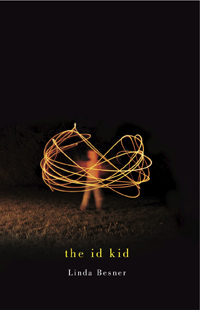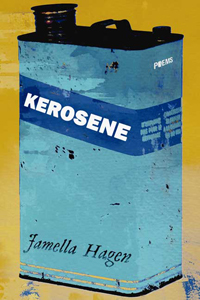Reviews
Poetry Review by Danielle Janess
Linda Besner, The Id Kid (Montreal: Signal, 2011). Paperbound, 82 pp., $18.
Jamella Hagen, Kerosene (Gibsons: Nightwood, 2011). Paperbound, 80 pp., $18.95
Bright, witty, exuberant, Linda Besner’s debut poetry collection, The Id
Kid, wants to play. With all the gap-toothed, off-kilter charm of a classroom
wunderkind, the book displays a talent for word games, an acrobatic
intellect, and an absurd sense of humour. Take, for example,
“Self-Portrait: Besner (Recto), Cactus (Verso)”—a nod to Giorgio
Morandi’s 1918-19 painting of a similar name. Alongside Besner’s
lighthearted freehand drawings, the poem is a wacky conversation
between the poet and a cactus, who quips: “Twenty-nine hours in the
bed of a truck and I woke up here. / Hostaged countertop potentate,
plagued by hot flashes / and drug mule spit, / alternating currents in
my nether / needles. / I bootstrapped my spurs to my own greenthumbs.”
Besner is having a blast, and her delight is catching. Vocally,
she shares an assonant, percussive dialect with contemporaries like
Christian Bök and Jeramy Dodds, though Besner makes her own
music, often with the addition of Français, as in “Villaneuve Villanelle,”
where tongue-slippage lilts bilingually: “Une idée, maybe, of
ivied-over avenues à suivre, asway with lilas, novelistic verandas.”
Formally inventive, she deliberately distorts language, using linguistic
corruption to move words beyond their habitual associations, as in
“Mornings with the Ove Glove,” where somersaulting repetitions surprise
the mind, launching further metaphor: “ […] the neighborhood
id kid / takes one giant leap and clears the fence. / His parents were
like everyone, swept up / in the us fuss, advancing the species faster
/ than the Russians. Hurrying to make their own / clone and send it
out there, the latest ape shape / clomping around the garden
barefaced as a dartboard.”
play. With all the gap-toothed, off-kilter charm of a classroom
wunderkind, the book displays a talent for word games, an acrobatic
intellect, and an absurd sense of humour. Take, for example,
“Self-Portrait: Besner (Recto), Cactus (Verso)”—a nod to Giorgio
Morandi’s 1918-19 painting of a similar name. Alongside Besner’s
lighthearted freehand drawings, the poem is a wacky conversation
between the poet and a cactus, who quips: “Twenty-nine hours in the
bed of a truck and I woke up here. / Hostaged countertop potentate,
plagued by hot flashes / and drug mule spit, / alternating currents in
my nether / needles. / I bootstrapped my spurs to my own greenthumbs.”
Besner is having a blast, and her delight is catching. Vocally,
she shares an assonant, percussive dialect with contemporaries like
Christian Bök and Jeramy Dodds, though Besner makes her own
music, often with the addition of Français, as in “Villaneuve Villanelle,”
where tongue-slippage lilts bilingually: “Une idée, maybe, of
ivied-over avenues à suivre, asway with lilas, novelistic verandas.”
Formally inventive, she deliberately distorts language, using linguistic
corruption to move words beyond their habitual associations, as in
“Mornings with the Ove Glove,” where somersaulting repetitions surprise
the mind, launching further metaphor: “ […] the neighborhood
id kid / takes one giant leap and clears the fence. / His parents were
like everyone, swept up / in the us fuss, advancing the species faster
/ than the Russians. Hurrying to make their own / clone and send it
out there, the latest ape shape / clomping around the garden
barefaced as a dartboard.”
Not only Besner’s gymnastic use of language, her preoccupations and personae also please the reader with their curiosities. In “Umbrella,” the object of the poem is “a blown disguise, / a daddylong- legs on a steel leash.” Elsewhere, capsicum abounds in “atavistic redolence,” and blossoming pear trees are “just coming into dub.” Vaudevillian in assortment, the book’s five sections stage a motley cast of characters where family members, friends, and ordinary objects come wildly to life: a magician-uncle named Zenek; another uncle, the family car salesman; cognitive psychologist parents; a “carnival bohunkus;” shrieking kids at the swimming pool, and in “Wartime Puppet Play of the Kitchen Stove:” “the voices of disembodied mice / Uplifted with the tin can resistance in their banned anthem, / La Mayonnaise.”
I emphasize the book’s conscious interplay with theatrics because it reflects the collection’s best and worst qualities. Set across an entire book, this funhouse of zany characters, hybrid language, and mindbending boobytraps can leave the reader exhausted. With her inappropriate jokes and sensationalist hooks (“Hummingbirds are Solipsists / they kill us for their sport”), Besner runs, at times, the risk of seeming as if she’ll do anything for attention—and this tendency can verge on the desperate gimmick. To my mind, she is at her best when relaxing formal contrivance enough to let in genuine feeling. One of the book’s highlights, a trio of poems set in construction sites, and corresponding to great American stage plays, imagines the dialogue between a plastic sheet, a scaffold, a pit, and a strip of caution tape. In “Demolition Site: AIDS, 1990, after Angels in America,” Besner conducts an inspired scene of tragicomedy, in a genius conceit:
PLASTIC SHEET:
Snails’ tails and sludgy bubblegum, the new tarmac’s
getting laid, lucky thing. It has possibilities, this décor,
n’est-ce pas? Bolts of orange silk, bold blue-and-white
Tyvek moving in. I’m hanging on by spider-spit.
The dandelion heads orbiting the scragged edges
will see more of how the world turns than I.
Swapping the urban for the rural, Kerosene, “what we used to burn for
light / before  power lines snapped and hummed” is the title of Jamella
Hagen’s first book. Though the speaker spends a portion of time in
Vancouver, the book also deals with her drift from, and eventual
return to, the rural North, and with the people and places of her accumulated
experience. The first four poems introduce us to the speaker
as a child, her mother, father, and cabin home, providing immediate,
plain access to the book’s concerns, a world where animals nose
through the bush to the yard, mother keeps a rifle close at hand, moonshine
gleams on the table, and the lawn is “a hayfield / cut with a
scythe.” Here is no tomfoolery, only poems that stick close by their
roots, straightforward as a handshake, going by names like, “Early
Life on the Farm,” and “What I Think of When My Father Calls.” Consider
the reliable progression of “An Introduction to My Mother”:
power lines snapped and hummed” is the title of Jamella
Hagen’s first book. Though the speaker spends a portion of time in
Vancouver, the book also deals with her drift from, and eventual
return to, the rural North, and with the people and places of her accumulated
experience. The first four poems introduce us to the speaker
as a child, her mother, father, and cabin home, providing immediate,
plain access to the book’s concerns, a world where animals nose
through the bush to the yard, mother keeps a rifle close at hand, moonshine
gleams on the table, and the lawn is “a hayfield / cut with a
scythe.” Here is no tomfoolery, only poems that stick close by their
roots, straightforward as a handshake, going by names like, “Early
Life on the Farm,” and “What I Think of When My Father Calls.” Consider
the reliable progression of “An Introduction to My Mother”:
She’s standing naked
in the bathtub at midnight, in her gumboots.
Beneath her feet, the submerged
pack rat trap: long wood box
with a trick door. Inside it, the rat
drowning. My brother sleeping upstairs.
Night ticks forward quiet as a child’s
held breath, the light switched off, water
flat as a mirror – until the rat
untricks the hatch and springs out,
wet and mad and desperate.
Did they look each other in the eye
before she started stomping?
The recorded details of personal, childhood memory are organized into a cohesive, aurally recurring music—the “oo” sounds in gumboots, wood, door, look; the rhymes of night/light, ticks/untricks, and wet/desperate, that presumably reassure a reader. But drawn in by the narrative, I am bored by the verse—by the expected comparison of water to mirror, by time that obviously “ticks forward.” Though Kerosene lacks the fresh audacity of The Id Kid, there are rewards here, instances of what Mahmoud Darwish describes as an abyss, abstract and lightweight, stronger than memory. I admire Hagen’s elegant economy, demonstrated in “Leaving the North,” talking of a certain time in Vancouver: “got the feeling / that in this city if you split open / any wall, you’d find / something awful inside— / mould, asbestos, parts / of lost women. So many / were missing then. It was a record year // for rain."
—Danielle Janess









